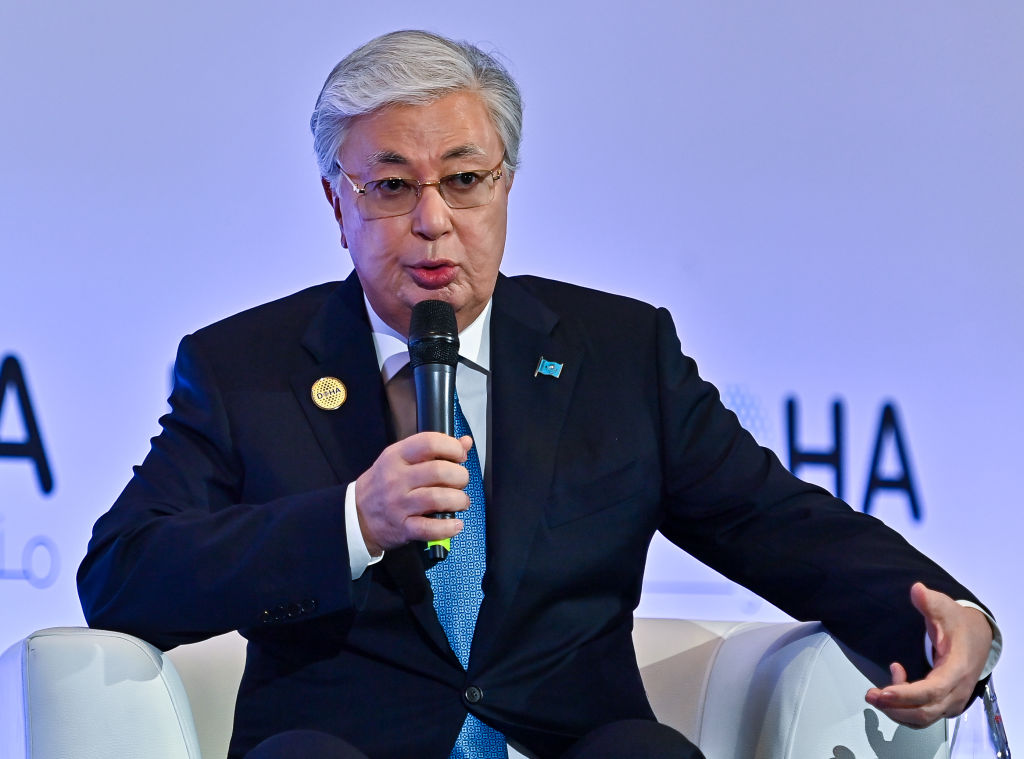Kassym-Jomart Tokayev: “The Goal is to Strengthen the Economy and Sovereignty”
Interview with the Head of State for the “Ana tili” Newspaper.

Dear Mr. President, last year in your interview with the newspaper Egemen Qazaqstan, you summarized the main achievements of the year and outlined the key directions for the year ahead. This is becoming a commendable tradition that helps citizens better understand the essence of the country’s development. I am confident that today’s conversation will also be informative and open. To start, what do you consider the most remarkable achievements for Kazakhstan in the past year?
Last year was marked by many important events, and a great deal of work was accomplished. For example, engineering and communal infrastructure across all regions underwent modernization after having fallen into a deplorable state. A total of 18 million square meters of housing was completed, and 7,000 kilometers of highways were built or repaired. New passenger terminals were inaugurated at the airports in Almaty, Kyzylorda, and Shymkent. Large-scale projects were implemented in the mining, petrochemical, and metallurgical industries. The manufacturing sector also saw active development, with its share in the industrial structure now almost equal to that of the extractive sector. I would particularly like to highlight the success of our agricultural sector, which achieved a record harvest of nearly 27 million tons of grain—the highest in the past decade.
At the beginning of last year, I mentioned in an interview that 2024 would be a defining year for Kazakhstan in many respects. And so it turned out to be. By launching systemic and even challenging economic reforms, we laid a solid foundation for the country’s five-year development plan. Numerous projects and initiatives have been realized in this direction, and many more are on the horizon.
Kazakhstan is a social state, which is why last year we began payments under the National Fund for Children program. Pensions, allowances, scholarships, and salaries for civil servants were increased. Hundreds of new schools, kindergartens, and sports centers were built nationwide. More than ten branches of leading foreign universities were established. Funding for science was increased, and cultural figures received significant support. Special emphasis was placed on developing mass sports. All these measures represent valuable investments in strengthening the creative potential of our citizens.
In the face of unprecedented geopolitical tension, Kazakhstan has solidified its position on the international stage as a country playing a constructive role in fostering dialogue for the sake of peace. This has positively influenced the security and sustainable economic development of our country.
Overall, the past year was challenging—one could even say difficult. Kazakhstan faced the negative impacts of external factors, and natural disasters disrupted some of our plans. Yet, we not only managed to stabilize the situation but also continued implementing reforms. Thus, our strategy of creation remains on course for further development.
You mentioned the unprecedented floods that affected half of the country’s regions last spring. At that time, you gave specific instructions to the relevant authorities to address the disaster’s aftermath. Citizens noted that significant efforts were made. However, the floods also exposed many underlying issues. What lessons has the state learned from this natural disaster?
Last year’s floods were a significant test for our country. Kazakhstan had never experienced such widespread flooding before. However, the state responded promptly to this critical situation. Evacuations were organized in a timely manner, temporary shelters were established, and material reserves were mobilized. Rescue operations involved not only the Ministry of Emergency Situations but also the Ministry of Internal Affairs, the Ministry of Defense, the National Guard, and other agencies—amounting to about 63,000 personnel. We saved lives and ensured people’s well-being, which remains the most important outcome.
An important lesson from this devastating flood is that such challenges can only be overcome through collective effort. During the floods, we witnessed firsthand the immense potential of volunteer movements. Volunteers from across the country supported rescue efforts, collected humanitarian aid, and provided assistance to those affected.
The flooding caused significant destruction—homes, roads, bridges, and social and commercial facilities were damaged, and livestock losses were recorded. It must be acknowledged that many of these severe consequences could have been avoided if, in past decades, sufficient attention had been given to constructing protective dams and other hydraulic structures.
We are now addressing these shortcomings. Parliament is reviewing a draft of the new Water Code. A comprehensive water resource management plan and concept have been approved. These documents outline plans to construct over 40 new reservoirs, reconstruct 37 existing ones by 2030, and modernize more than 14,000 kilometers of irrigation canals.
Additionally, a large-scale modernization of emergency forecasting and prevention systems is underway. To tackle the shortage of water specialists and bolster research, we have established the Kazakh National University of Water Management and Irrigation.
In early December, I participated in the One Water Summit in Saudi Arabia, co-chaired by Kazakhstan and France. During this important event, I emphasized the need to enhance resilience to water-related disasters. Addressing water security and combating climate change requires collaborative efforts from the international community, and this remains a priority for Kazakhstan.
Challenging times often expose deep-seated societal issues. Yet, every crisis brings opportunities. Therefore, such situations should be met with pragmatism, not excessive dramatization. We must approach problems with a constructive mindset and find effective solutions.
While government officials often face unwarranted criticism, success is relative and best evaluated through comparison with other countries. From the coronavirus pandemic to the present, Kazakhstan has effectively managed crisis situations.
The swift response to the spring floods demonstrated the state’s effectiveness. No affected family was left without help or support. Houses were rebuilt, apartments purchased, infrastructure restored, and financial losses reimbursed to all residents and businesses impacted by the high water—all within a short timeframe. Contributions from major businesses also played a significant role in addressing the flood’s aftermath.
In today’s turbulent world, the frequency of natural and man-made disasters is increasing, and not all nations—even developed ones—are adequately prepared. As we saw in 2024, Kazakhstan has shown commendable readiness in emergency response, though there is still much work to do. Compared to other countries, Kazakhstan has performed well in this regard.
In late December, a tragic plane crash involving an Azerbaijani airline occurred in the Mangistau region, claiming the lives of 38 people, including six citizens of Kazakhstan, and leaving many others seriously injured.
In such emergencies, every second counts. Our rescuers, medics, and police acted promptly and professionally, displaying both competence and civic responsibility. Employees of the Mangistau Regional Power Grid Company, who were near the crash site, immediately assisted the injured, while local residents also stepped forward. Thanks to this collective selflessness, as many lives as possible were saved. I extend my sincere gratitude to everyone involved in the rescue operations.
The solidarity and compassion of the Kazakh people were evident in the overwhelming number of citizens who rushed to donate blood for the victims.
A government commission has been established to investigate the causes of the crash. Additionally, 17 international experts, including representatives from ICAO and the Interstate Aviation Committee (IAC), have been invited. The commission has decided to send the flight recorders to Brazil, where the aircraft was manufactured, for decoding. This decision ensures an objective and impartial investigation, which is the only correct course of action.
You mentioned your participation in an international forum in Saudi Arabia. Over the past year, there have been numerous such events, leading to speculation about your preference for foreign policy: some say the President, as a professional diplomat, is naturally inclined towards international activities. Is this true?
Kazakhstan’s geographical location, economic potential, and modern geopolitical context position it as a country of strategic importance in the eyes of most nations. This is why not only our traditional partners but also countries as far as Africa seek to maintain friendly relations with us.
Globally, Kazakhstan is often referred to as a middle power. This status comes with significant responsibilities, including the need for responsible conduct on the international stage and a constructive approach to addressing the most pressing issues of our time. Consistent with this, Kazakhstan is a steadfast supporter of the United Nations as the “common home of all humanity”—a non-alternative and universal organization.
At the same time, as Head of State, I deal with domestic policy issues on a daily basis and consider this work absolutely essential. Therefore, the claim that my activities are disproportionately focused on foreign policy is inaccurate.






